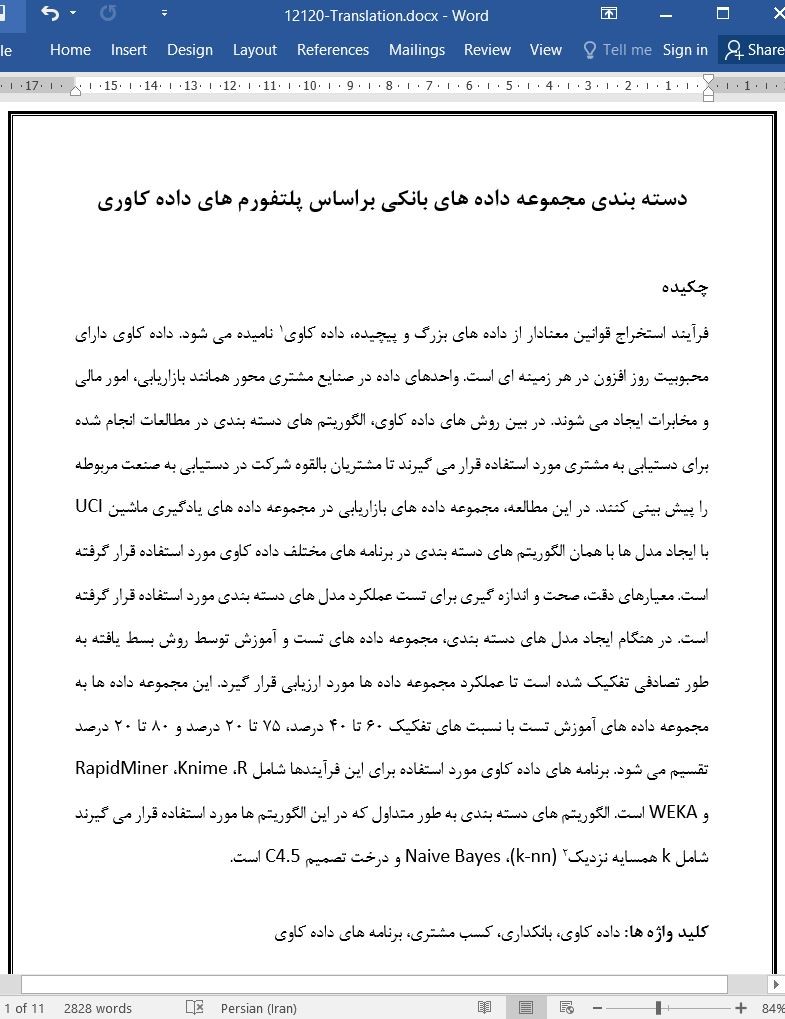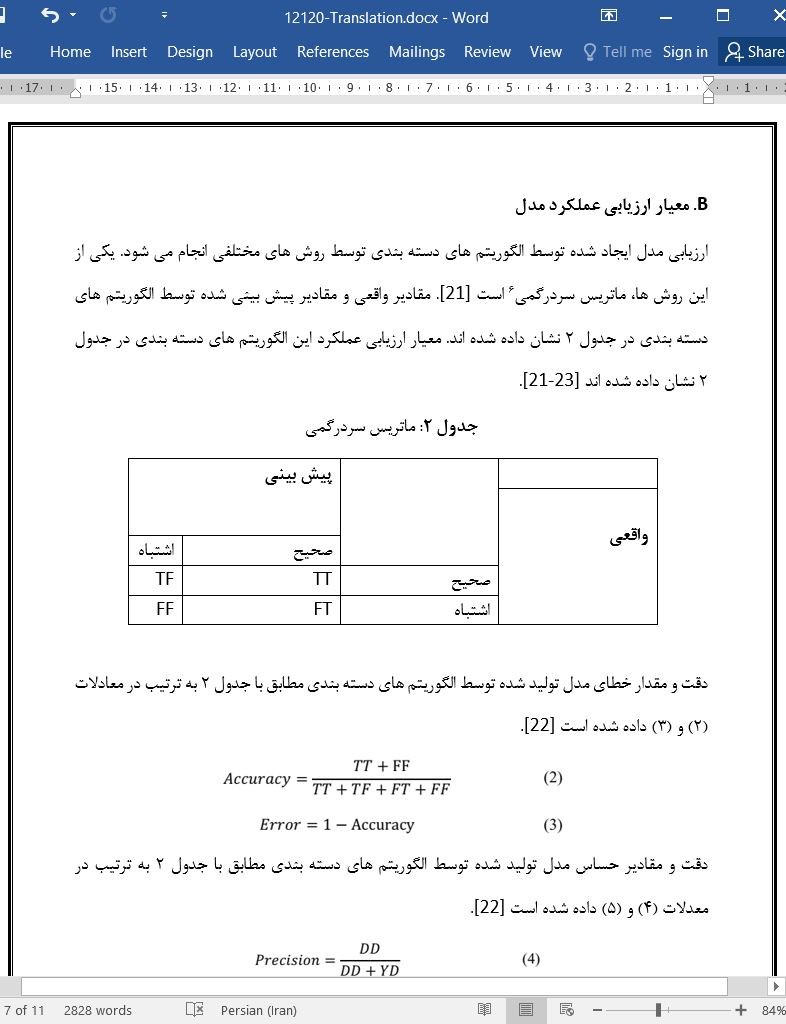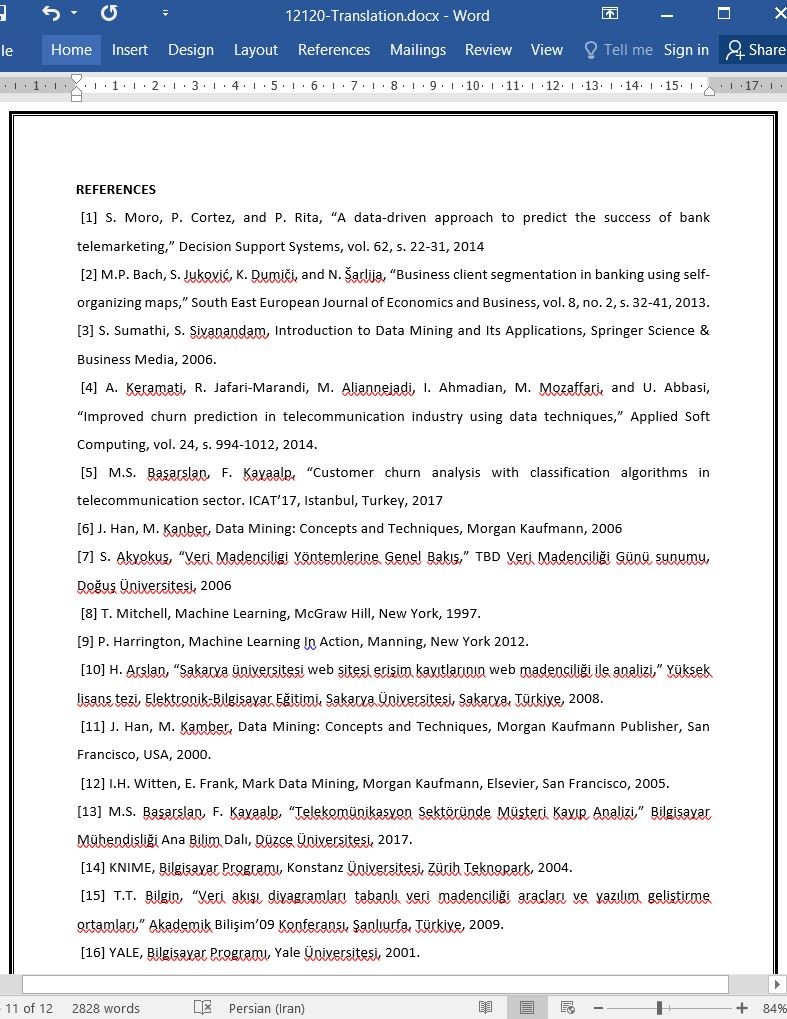
دسته بندی مجموعه داده های بانکی بر اساس پلتفورم های داده کاوری
چکیده
فرآیند استخراج قوانین معنادار از داده های بزرگ و پیچیده، داده کاوی نامیده می شود. داده کاوی دارای محبوبیت روز افزون در هر زمینه ای است. واحدهای داده در صنایع مشتری محور همانند بازاریابی، امور مالی و مخابرات ایجاد می شوند. در بین روش های داده کاوی، الگوریتم های دسته بندی در مطالعات انجام شده برای دستیابی به مشتری مورد استفاده قرار می گیرند تا مشتریان بالقوه شرکت در دستیابی به صنعت مربوطه را پیش بینی کنند. در این مطالعه، مجموعه داده های بازاریابی در مجموعه داده های یادگیری ماشین UCI با ایجاد مدل ها با همان الگوریتم های دسته بندی در برنامه های مختلف داده کاوی مورد استفاده قرار گرفته است. معیارهای دقت، صحت و اندازه گیری برای تست عملکرد مدل های دسته بندی مورد استفاده قرار گرفته است. در هنگام ایجاد مدل های دسته بندی، مجموعه داده های تست و آموزش توسط روش بسط یافته به طور تصادفی تفکیک شده است تا عملکرد مجموعه داده ها مورد ارزیابی قرار گیرد. این مجموعه داده ها به مجموعه داده های آموزش تست با نسبت های تفکیک 60 تا 40 درصد، 75 تا 20 درصد و 80 تا 20 درصد تقسیم می شود. برنامه های داده کاوی مورد استفاده برای این فرآیندها شامل R، Knime، RapidMiner و WEKA است. الگوریتم های دسته بندی به طور متداول که در این الگوریتم ها مورد استفاده قرار می گیرند شامل k همسایه نزدیک (k-nn)، Naive Bayes و درخت تصمیم C4.5 است.
1. مقدمه
امروزه داده کاوی در راهکار مشکلات در بسیاری از حوزه ها همانند سلامت، امور مالی و آموزش مورد استفاده قرار می گیرد. مطالعات داده کاوی در حوزه سلامت برای تشخیص بیماری ها، در صنایع مشتری محورر همانند ارتباطات، بیمه و بانکداری برای کار بر روی دستیابی به مشتری به کار گرفته شده اند. در این پژوهش یک مطالعه پیش بینی کننده برای مشاهده این مساله انجام شده است که آیا کمپین یک بانک منجر به کسب مشتری می گردد یا خیر. هدف دیگر این مطالعه مشاهده نتیجه همان الگوریتم های دسته بندی در برنامه های مختلف داده کاوی است. نتایج به دست آمده در جداول و بخش نتایج ارائه شده است.
Abstract
The process of extracting meaningful rules from big and complex data is called data mining. Data mining has an increasing popularity in every field today. Data units are established in customer-oriented industries such as marketing, finance and telecommunication to work on the customer churn and acquisition, in particular. Among the data mining methods, classification algorithms are used in studies conducted for customer acquisition to predict the potential customers of the company in question in the related industry. In this study, bank marketing data set in UCI Machine Learning Data Set was used by creating models with the same classification algorithms in different data mining programs. Accuracy, precision and f- measure criteria were used to test performances of the classification models. When creating the classification models, the test and training data sets were randomly divided by the holdout method to evaluate the performance of the data set. The data set was divided into training and test data sets with the 60-40%, 75-25% and 80-20% separation ratios. Data mining programs used for these processes are the R, Knime, RapidMiner and WEKA. And, classification algorithms commonly used in these platforms are the k-nearest neighbor (k-nn), Naive Bayes, and C4.5 decision tree.
I. INTRODUCTION
Today, data mining is used in the solution of problems in many fields such as health, finance and education. Data mining studies are being carried out in the field of health for diagnosis of the disease, in customer-oriented industries such as telecommunication, insurance and banking to work on customer churn and customer acquisition. In this research, a forecasting study was carried out to see whether the campaign of a bank results in new customer acquisition. Another purpose of this study is to see the results of the same classification algorithms in different data mining programs. Obtained results were shown in tables in the results section.
چکیده
1. مقدمه
2. مرور کلی
A. داده کاوی
B. الگوریتم های دسته بندی مورد استفاده در این مطالعه
C. برنامه های داده کاوی
3. کاربرد
A. مجموعه داده ها
B. معیار ارزیابی عملکرد مدل
4. نتایج و نتیجه گیری
5. بحث
منابع
Abstract
1 Introduction
2 Overview
A. Data Mining
B. Classification Algorithms Used in the Study
C. Data Mining Programs
3 Application
A. Data Set
B. Model Performance Evaluation Criteria
4 Results and Conclusion
5 Diccussion
REFERENCES
- اصل مقاله انگلیسی با فرمت ورد (word) با قابلیت ویرایش
- ترجمه فارسی مقاله با فرمت ورد (word) با قابلیت ویرایش، بدون آرم سایت ای ترجمه
- ترجمه فارسی مقاله با فرمت pdf، بدون آرم سایت ای ترجمه



